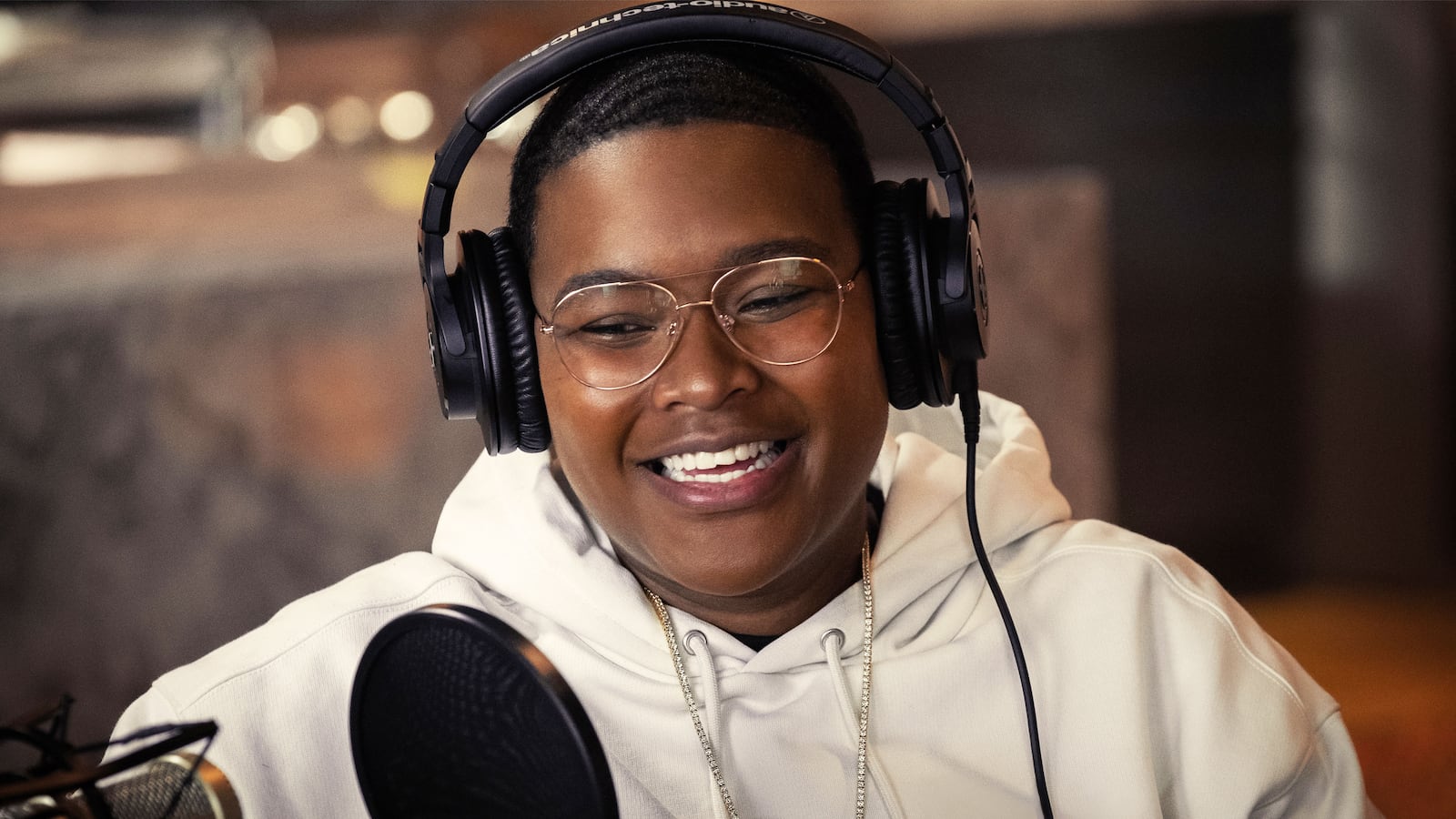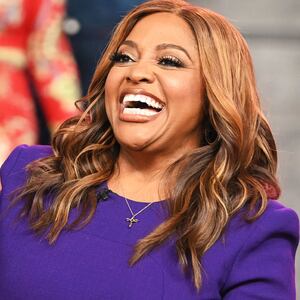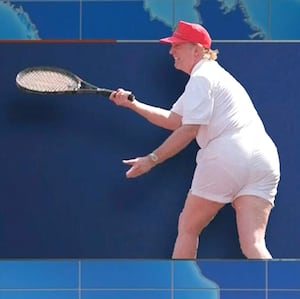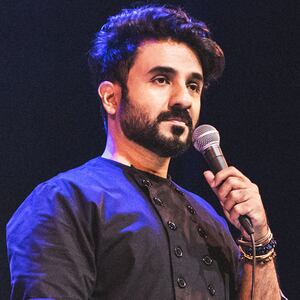Since leaving her gig as a writer at Saturday Night Live in 2020, Sam Jay has become an increasingly prolific force in the comedy world. From her debut hour-long Netflix special 3 in the Morning, to her unique take on the late-night variety show Pause for HBO, to co-creating the sitcom Bust Down for Peacock, the Atlanta-born, Boston-raised comic has already shown audiences that she contains multitudes. And all of that was before her breakout performance in the new Netflix movie You People.
In her return to The Last Laugh podcast, Jay talks about how she landed her key role as a rom-com bestie and responds to some of the backlash the film has received from critics of writer/director Kenya Barris. She also opens up about her decision to leave SNL, reveals the fate of Pause, and addresses those who felt “hurt” by her jokes comparing trans women to X-Men.
Four years ago, Jay was a relatively unknown writer at SNL struggling to get her sketches on the air as movie stars like Eddie Murphy and Jonah Hill came through to host. She fondly recalls the “surreal” experience of collaborating with Murphy, who brought his Velvet Jones character to her “Black Jeopardy” sketch, but still remembers failing to get anything on the air the last time Hill hosted in 2018. Now, Jay is right there with them on screen, landing some of the funniest jokes in their new Netflix movie You People.
In the film, Jay plays one-half of the podcast duo Mo and Ezra opposite Hill and is constantly dispensing vital life advice as he pursues a relationship with Lauren London’s Amira and struggles to connect with her parents, played by Murphy and Nia Long. TV legends Julia Louis-Dreyfus and David Duchovny round out the main cast as Ezra’s Jewish parents, who spend the whole film trying way too hard to seem woke.

Jay says she “didn’t believe” that Barris’ offer for her to play Hill’s wingwoman was real until her manager reached out a couple weeks later to confirm that the part was hers if she wanted it. And it was just as “overwhelming” as she imagined it would be to finally be sharing the screen with Murphy, who she grew up idolizing.
“It’s a lot of big players,” she says. “So I would just try to make sure I was keeping up, just make sure I was swimming in the stream with the rest of the salmon and not being left behind. I was just trying to hold my part of the deal.”
And while London has admitted she was “apprehensive” about starring in a film that has been accused of perpetuating racial stereotypes through the interracial relationship at its center, Jay tells me she didn’t share those concerns.
“Everybody has an opinion,” she says. “That’s the business of making stuff, people are going to have opinions about it. There’s really no way around that. To me, there’s people who love it and feel like it was great and gave them what they needed and opened up conversations for them, and there are people who hate it and feel like it was bad for society. And that’s just what happens when you make anything.”
Below is an edited excerpt from our conversation. You can listen to the whole thing by subscribing to The Last Laugh on Apple Podcasts, Spotify, Google, Stitcher, Amazon Music, or wherever you get your podcasts, and be the first to hear new episodes when they are released every Tuesday.
So let’s talk about Pause, which is a show that I love. It was this really big opportunity to do your own thing—and congrats on the Writers Guild Award nomination, by the way. How did you think about that when you knew it was time to leave SNL? What were your thoughts about what you wanted to make?
I just wanted to make a vehicle that made sense for me and that felt like me, and it didn’t feel right for me to sit behind a desk. I just didn’t want to do that. And so I was trying to think of a late-night show format that allowed me some freedom of thought, expression, and also just something I hadn’t seen. We already have a bunch of shows with people behind a desk, but what do we not have? What haven’t we seen? And what’s another way to spark conversation and dialogue? I just tried to make something that was—I don’t want to say grounded, but something that was more connected to actual people. We know the people that everyone talks to, like Cornel West and whoever you call on race and whoever you call on politics. But what are day-to-day people thinking and what are day-to-day people saying and how are they feeling? So we wanted to do a show where our guests are just, like, people.
Yeah, I think the show is so unique and does feel so different from everything else on TV, especially because of those party scenes that you guys do. Was that the idea from the beginning to include those, or how did that come about?
I mean, we had a lot of different iterations of ideas, honestly, and we were just trying to find the one that made sense and fit. At some point, I called [executive producer] Prentice Perry drunk and I was like, “Yo! I get it. It should be a party. Do you get it?” And he was like, “No, I don’t understand what you’re talking about.” And I was like, “Cool, I’m gonna call you when I’m sober.” So I called him the next morning and I explained it to him better than I did previously. And he was like, “Oh, yeah, I see what you’re saying, kind of like a Playboy After Dark thing.” And I was like, “Yeah, but more like a real party in a real apartment.” So we went to HBO and said this is the direction we want to go in, and they were like, let’s see.
Is there a conversation from one of those party scenes that stands out in your memory as changing your mind about something? Because I know a big part of the show is presenting different points of view. Was there a time where you left thinking about something differently?
Yeah, I feel like every episode I left a little different. It wasn’t necessarily from the party, but the exploration of the topic in its entirety. I feel like every single one of them I left with some more perspective.
What about plans for Season 3? Does it seem like it’s going to happen?
No, Pause isn’t coming back. We’re done.
You found that out for sure?
Yeah, I know that for sure.
Was that your decision? Was it disappointing?
No, it wasn’t my decision. It was kind of disappointing, but I was also drained. It was a draining show, because it was very personal. So I was feeling a little spent from it, to be honest. And I was going to take a year off anyway. I had vocalized that I wanted to do that, because I just felt like I needed to re-up my energy on it and have something to say. And, I don’t know, I feel like this is the industry we’re in. You’re not really in control of that part of it. You can only make the thing you believe in and put it out there and hope people take to it and hope the network gets it, and it all works out. And it may or may not. So I don’t get overly attached to stuff. I’m glad I got to do it, and I feel really good and proud of the thing that I made. And I’m very proud of everybody that worked on the show and put their blood and sweat and tears into making something that was super challenging. I really think we pulled off something cool. I think it was a little ahead of its time and people will look back on it and be like, “Wow, that was a really cool thing that was happening right there.” And that’s good enough for me. I’m on to other things and exploring other ideas and creating other stuff, which is all I want the ability to do, is to just keep making things. So I’m in a good place.
So you’ve been steadily getting more famous over the past few years. And I’m wondering how you have handled that experience of fame and attention and media and all of that, because it’s a relatively new thing for you in the last few years.
Yeah, I mean, I feel like it’s just becoming that, I guess. It’s such a slow rise and it feels like this movie is turning a corner. But I don’t know that I know yet, honestly, how I’m going to deal with it. I just try to keep it grounded and understand that it’s not real.
There is that thing of, the bigger you get, the more people are potentially going to come after you for things. In the first season of Pause, you have that great episode where you talk about how when you got hired at SNL, you were worried about your old tweets and deleting jokes that you had made about people. Do you worry about getting big enough to get canceled?
No. There’s nothing I can do about it.
You got a taste of that type of controversy after your Netflix special 3 in the Morning came out. There was some backlash to your bit comparing trans women to X-Men. Were you surprised that that bit created some controversy? Or did you sort of know that would happen?
Hmm… 50/50.
Because, I mean, it’s obviously provocative. You didn’t quite get Chappelle-level backlash, but it did draw some attention. Do you think that part of it is that people expect you to have certain opinions because you’re a Black queer woman and that you subvert those expectations in your comedy sometimes?
Yeah, I think that’s a part of it. I think people think that they get to determine how you think by how you look. And when they can’t do that, it bothers them. I think another part of it is that people don’t listen. They’re triggered and they don't take things in its full context and they narrow in on something that bothered them rather than looking at the whole picture of what’s being said or attempted. I think another part of it is that there’s a lot of fucked-up shit that goes on in the world and people have a right to be sensitive about it.
Do you stand by that bit? Do you have any regrets about putting it in your special?
No, I don’t have any regrets about putting in my special. I don’t like that it hurt people’s feelings. That was not my intention, so that I regret. I didn’t go out to hurt anybody’s feelings. So if you actually walked away hurt by it, then, you know, that’s not the type of person I am. But other than that, no.
I think that’s always a really hard thing that I’ve talked to a lot of comedians about—intentions versus how people take something. I remember someone like Bill Burr saying that as long as his intentions are good, it shouldn’t matter how people take it and they basically shouldn’t be upset about it. But it sounds like you have a somewhat different perspective on that?
I don’t know that I have a different perspective. I’m just saying I don’t like hurting people’s feelings, that isn’t what I went out to do.
Beyond the movie and with those shows ending, what are your big goals moving forward? What are you wanting to do?
I just want to be able to keep making stuff. I enjoy the process of creating things. And in this medium of TV and film and stand-up and being funny, I just wanna be able to make things. I don’t really feel like it needs to be this or it needs to be that. I just want to keep making stuff.
Listen to the episode now and subscribe to The Last Laugh on Apple Podcasts, Spotify, Google, Stitcher, Amazon Music, or wherever you get your podcasts, and be the first to hear new episodes when they are released every Tuesday.




